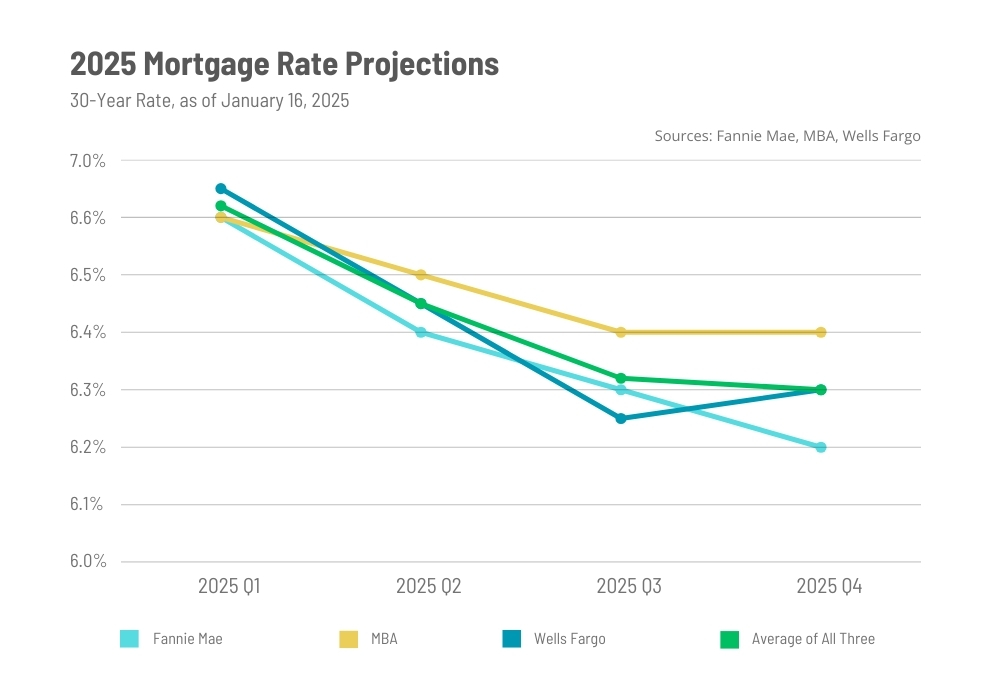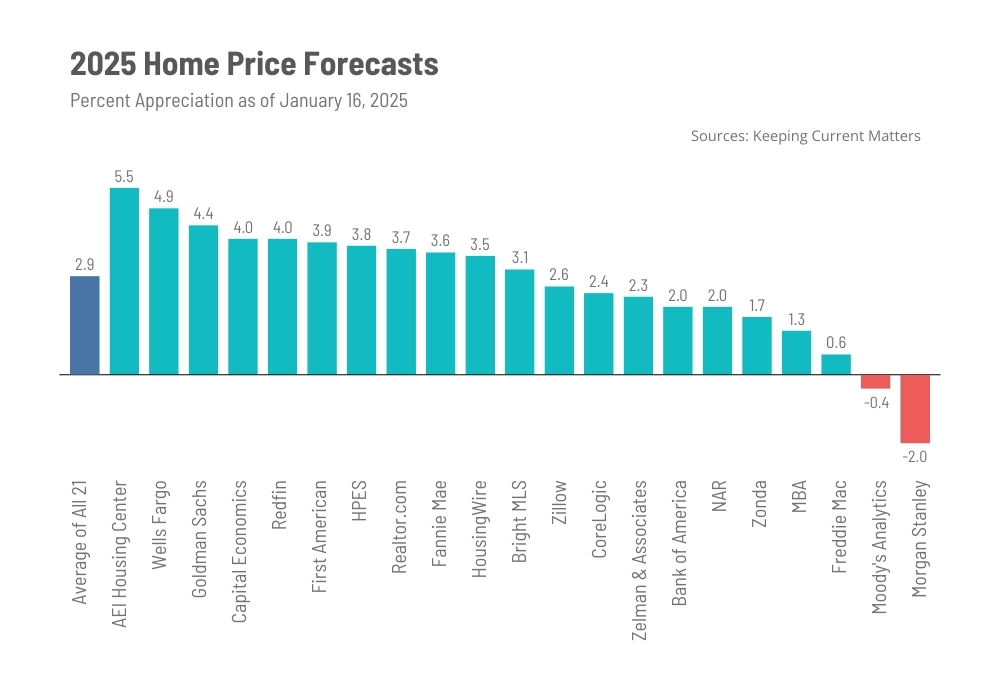Top housing experts and economists are already providing glimpses into what 2025 might hold. From potential shifts in mortgage rates to the stabilization of home price growth to pre-pandemic levels, this year is shaping up to be pivotal for real estate. Whether you’re planning to buy, sell, or simply stay informed, understanding the key factors at play is crucial.
Key Takeaways
- Mortgage rates are forecast to ease slightly, averaging about 6.4% through 2025.
- Stabilization of price growth offers relief for buyers while protecting homeowner equity.
- Incremental growth in inventory is expected, providing buyers with more options.
- Cooling of Inflation, robust employment, and potential federal policy shifts will continue to determine the market.
Let’s dive into the latest insights and predictions shaping the housing market this year.
Note: real estate is a dynamic market and forecasts made in this article will change as the year unfolds.
Will Mortgage Rates Come Down?
In recent years, mortgage rates have been a hot topic, and 2025 is no exception. Following a series of rate adjustments by the Federal Reserve, the expectation is for a gradual easing of rates as inflation continues to cool. Many experts predict this could lead to improved affordability, encouraging more buyers to enter the market.
So, the question is really: how far and how fast? The good news is they’re projected to ease a bit in 2025. But that doesn’t mean you should expect to see a return of 3-4% mortgage rates. As Lawrence Yun, Chief Economist at the National Association of REALTORS® (NAR), says:
Are we going to go back to 4%? Per my forecast, unfortunately, we will not. It’s more likely that we’ll go back to 6%.
And the other experts agree. They’re forecasting rates could settle in the mid-to-low 6% range by the end of the year (see graph below):

However, a recent stronger-than-expected employment report may prompt the Federal Reserve to pause further rate cuts at its upcoming meeting, with the current short-term rate of 4.25%-4.5% potentially holding steady into the spring homebuying season. While earlier forecasts suggested two rate cuts in 2025, some analysts are speculating that rate hikes could now be possible this year.
While the Federal Reserve’s actions don’t always have a predictable impact on mortgage rates, a strong labor market isn’t likely to ease them anytime soon. As Lawrence Yun explains, "Lingering inflation keeps rates elevated," though he anticipates calmer inflation in the future, which could eventually bring some relief.
While these forecasts reflect the best available data, they remain subject to change as new economic trends emerge. Partnering with a trusted lender and real estate agent ensures you’ll have up-to-date insights and a clear understanding of how market shifts impact your finances. Even a small dip in rates could significantly lower your future mortgage payments.
Home Prices Will Stabilize
Home prices have climbed dramatically in recent years. In fact, according to the Federal Housing Finance Agency (FHFA), over the past five years, home prices nationwide have risen by 57.4%! But, what will home values do in the next year?
While mortgage rates are expected to ease, home prices are projected to keep climbing in most areas – just at a slower, more normal pace. If you average the expert forecasts together, you’ll see prices are expected to go up roughly 3% next year, with most of them hitting somewhere in the 3 to 4% range. And that’s a much more typical and sustainable rise in prices (see graph below):

Why are prices still rising despite higher inventory levels? It all boils down to supply and demand. Although more homes are on the market than a year ago, the inventory still falls short of meeting buyer demand. As Redfin explains:
“Prices will rise at a pace similar to that of the second half of 2024 because we don’t expect there to be enough new inventory to meet demand.”
While home prices nationwide are expected to rise modestly, Silicon Valley often defies statewide trends. Experts predict the region could see even bigger gains in 2025, fueled by persistent demand and scarce inventory, keeping it one of the most competitive markets in the country.
Housing Supply: Incremental Growth
Housing shortages are expected to persist in 2025. It’s a general rule of thumb that a market where supply and demand are balanced has a six-month supply of homes. A higher number means supply outpaces demand, and a lower number means demand outpaces supply.
The national inventory sits at just four months, reflecting ongoing challenges for buyers. At this pace, the current homes on the market would be sold within four months.
Many homeowners remain locked into their low-rate mortgages, reluctant to sell and take on a higher-rate loan. In fact, a September Consumer Financial Protection Bureau report found that 60% of active mortgages are locked in at rates below 4%, far below today’s 7% average.
This "lock-in" effect continues to constrain inventory, as Danielle Hale, Chief Economist at Realtor.com, explains: "The mortgage rate lock-in effect will persist, especially while rates remain elevated."
Still, there’s hope ahead. Hale anticipates a modest rise in inventory early in 2025, with larger gains by spring that surpass typical seasonal trends. Inventory levels are expected to remain elevated through summer as life events prompt households to buy and sell, regardless of market conditions.
"Time will ease the lock-in effect, with only modest help from lower rates expected in 2025," Hale adds.
The Silicon Valley real estate market is expected to stay highly competitive in 2025, driven by a long-standing supply shortage. With just a 2-month inventory of homes for sale—a slight improvement from last year—housing remains far from balanced.
Will there be a ‘Trump bump’?
With President-elect Donald Trump’s second-term inauguration approaching, housing analysts anticipate significant policy shifts, potentially impacting the market. Realtor.com economists predict changes such as eased regulations, revised tax policies, and shifts in supply-demand dynamics.
Trump’s first term featured tax cuts, deregulation, and pro-business strategies aimed at economic growth. These could resurface in 2025, affecting mortgage rates, home construction, and affordability, says Hale. However, external factors like interest rates, inflation, and demographic trends may temper these impacts.
Trump’s proposals to address the housing shortage—releasing federal land for building, easing regulations, and combating inflation—face questions about feasibility and timing. Mortgage rates near 6% are expected to keep payments stable in 2025, despite rising prices. Economic growth and lower tax rates under Trump could boost incomes and disposable income, potentially improving affordability. According to Hale: "If incomes rise and taxes drop, homes may be more affordable in 2025."
That said, other parts of Trump’s agenda have sparked concern among economists and housing experts. Proposals to raise tariffs on key trade partners like China, Canada, and Mexico, as well as stricter immigration policies, could have ripple effects.
“Higher tariffs and tighter immigration controls would likely hit the construction industry hard, driving up costs,” cautions Hale.
What does this mean for you?
Home Buyers: If you’re thinking of purchasing a home, the sooner you start planning the better. Instead of trying to time the market, focus on strengthening your financial position by improving your credit score, setting aside additional savings for a down payment, and automating your contributions. Even if you’re in the market to buy in the next 12 to 24 months, talking with a real estate professional early in the process will set you up for success.
Home Sellers: Sellers need to clearly define and prioritize their objectives before entering the market. Is securing the highest possible price your top priority, or is selling within a specific timeframe more critical? Are you navigating a contingent sale, needing to sell your current home before purchasing your next one? Identifying these goals is essential to developing a tailored plan and marketing strategy that aligns with your needs.



